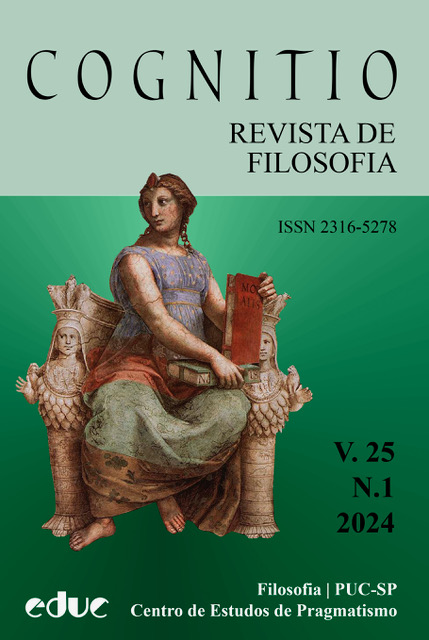Revisiting political pragmatism and education
Rawls, Dewey, Bernstein
DOI:
https://doi.org/10.23925/2316-5278.2024v25i1:e64973Keywords:
critical theory, liberalism, political philosophy, pragmatism, socialismAbstract
By placing John Dewey between John Rawls and Richard Bernstein, I argue for a socialist reading of Dewey’s takes on liberal democracy that moves away both from conservative readings of Dewey of those who claim that his democratic liberalism actually belongs to right-wing or center views, and from left-wing, communitarians who dismiss such views as irrelevant for socialist and radical variants of liberal democracy. Overall, it can be shown that Rawls and Dewey’s different takes on political liberalism could be ultimately reconciled, given their similar takes on democracy, pluralism, and the person. Rawls’ rehabilitation of Kant can itself be shown to be closely related to his reading of Dewey. Furthermore, as Bernstein argues, such a renewal of Dewey’s social and political philosophy in Rawls’s political constructivism and reflective equilibrium was decisive for the great pragmatist turn observed in the second, third, and fourth generations of critical theory, not only in the so-called Frankfurt School (especially Habermas, Honneth, Forst) but also in feminist and decolonial thinkers such as Nancy Fraser, Seyla Benhabib, Judith Butler, Rahel Jaeggi, and Amy Allen. Dewey’s pragmatist turn in political philosophy allows thus for a dynamic, robust correlation between radical democracy and public education, which could be implemented in emerging democracies like Brazil.References
ANDERSON, Elizabeth. What is the Point of Equality? Ethics, v. 109, p. 287-337, 1999. https://doi.org/10.1086/233897
BENHABIB, Seyla. The Generalized and the Concrete Other: The Kohlberg-Gilligan Controversy and Feminist Theory. In: BENHABIB, Seyla; CORNELL, Drucilla (eds.). Feminism as Critique: On the Politics of Gender. Minneapolis, MN: University of Minnesota Press, 1987.
BERNSTEIN, Richard J. John Dewey. New York: Washington Square Press, 1966.
BERNSTEIN, Richard J. Praxis and Action: Contemporary Philosophies of Human Activity. Philadelphia: University of Pennsylvania Press, 1971.
BERNSTEIN, Richard J. The Pragmatic Turn. New York: Polity Press, 2010.
CAMPBELL, James. Understanding John Dewey: Nature and Cooperative Intelligence. Chicago: Open Court, 1996.
CASTILLO, Ramón del; FAERNA, Ángel; HICKMAN, Larry (eds.). Confines of Democracy: Essays on the Philosophy of Richard J. Bernstein. Leiden: Brill, 2015.
CELIK, Rasit. Rawls and Dewey on Democracy, Pluralism, and the Person. Etica & Politica/Ethics & Politics, v. XXI, n. 2, p. 209-224, 2019.
COHEN, G.A. Rescuing Justice and Equality. Cambridge: Harvard University Press, 2008.
DEWEY, John. Construction and Criticism. New York: Columbia University Press, 1930.
DEWEY, John. John Dewey: The Early Works, 1882-1898, Carbondale: Southern Illinois University Press, 1971.
DEWEY, John. Democracy and Education. Carbondale and Evansville. Southern Illinois University Press, 1985.
DEWEY, John. Human Nature and Conduct: An Introduction to Social Psychology. New York: Cosimo Classics, 2007.
DEWEY, John. Reconstruction in Philosophy. New York: New American Library, 1950.
DEWEY, John. The Need for a Recovery of Philosophy. Creative Intelligence: Essays in the Pragmatic Attitud. reprinted in John Dewey: On Experience, Nature and Freedom, ed. by Richard J. Bernstein. New York: The Liberal Arts Press, 1960.
DILWORTH, David A. Santayana’s Review of Dewey’s Experience and Nature: Pivotal Expression of a Philosophy of Living Nature and Vivacious Spirit. Bulletin of the Santayana Society, v. 21, p. 15-30, 2003. https://doi.org/10.5840/200321215
FRASER, Nancy. Pragmatism, Feminism, and the Linguistic Turn. In: BENHABIB, Seyla; BUTLER, Judith; CORNELL, Drucilla; FRASER, Nancy (eds.). Feminist Contentions: A Philosophical Exchange. New York: Routledge, 1995.
GREEN, Judith M. (ed.). Richard J. Bernstein and the Pragmatist Turn in Contemporary Philosophy: Rekindling Pragmatism’s Fire. New York: Palgrave Macmillan, 2014.
HABERMAS, Jürgen. Legitimation Crisis. Trad. T. McCarthy. Boston: Beacon Press, 1975.
HABERMAS, Jürgen. Zur Rekonstruktion des historischen Materialismus. Frankfurt: Suhrkamp. In English: Communication and the Evolution of Society. Boston: Beacon, 1979.
KANT, Immanuel. Über Pädagogik. In: WEISCHEDEL, Wilhelm (ed.). Schriften zur Anthropologie, Geschichts-philosophie, Politik und Pädagogik. v. 2. Frankfurt: Suhrkamp, 1977.
PARFIT, Derek. Equality or Priority. In: CLAYTON, M; WILLIAMS, A (eds.). The Ideal of Equality. Basingstoke: Palgrave McMillan, 2002.
RAWLS, John. A Theory of Justice. Cambridge, Mass.: Harvard University Press, 1971.
RAWLS, John. Collected Papers. FREEMAN, Samuel (ed). Harvard University Press, 1999.
ROGERS, Melvin L. Dewey, Pluralism, and Democracy: A Response to Robert Talisse. Transactions of the Charles S. Peirce Society, v. 45, n. 1, p. 75-79, 2009. https://doi.org/10.2979/tra.2009.45.1.75
RORTY, Richard. Consequences of Pragmatism: Essays 1972-1980. Minneapolis: University of Minnesota Press, 1982.
RUSSELL, Stuart J.; NORVIG, Peter. Artificial Intelligence: A Modern Approach. 4. ed. London: Pearson, 2022.
ULLMANN, Reinholdo. A universidade medieval. Porto Alegre: Edipucrs, 2000.
Downloads
Published
How to Cite
Issue
Section
License
Copyright (c) 2024 http://creativecommons.org/licenses/by/4.0/

This work is licensed under a Creative Commons Attribution 4.0 International License.









